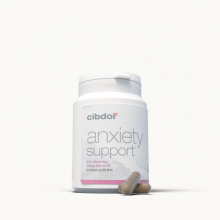Peace
of mind
Mood Information Page

Peace of mind is priceless
It allows you to take back control of your thoughts, feelings, and mood to focus on the things that matter most. However, with the pressures of modern living, it's becoming increasingly difficult to reach that all-important state of tranquillity.
- How does the mind work?
- Mood disorders: Causes
- Mood disorders: Symptoms
- Mood disorders: Small changes you can make
- Ingredients that may help
Our mood suggestion
How does the mind work?
The brain is our body's most complex organ.
Inside the brain, dozens of sophisticated structures help to process the world around us. Alongside hormones, neurochemicals, and electrical signals, the brain tries to make sense of what we see, hear, smell, touch, and taste.
1
Basal ganglia
Involved in motor control and motor learning
2
Ventral striatum
Vital for reward-related behaviour
3
Amygdala
Responsible for anxiety, emotion, and fear
4
Hippocampus
Essential for memory and learning
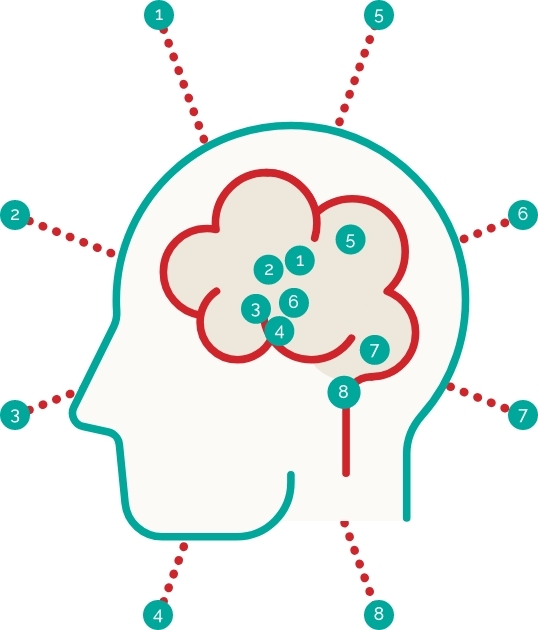
5
Neocortex
Manages sensory perception and cognition
6
Hypothalamus
Controls hormone release for many essential functions
7
Cerebellum
Crucial for movement and motor control
8
Brainstem
Regulates breathing, heart rate, and balance
Chemical imbalance and information overload
With so much going on, it's not surprising that this delicate balance of neurochemicals and brain signals can go awry. Whether due to underlying health conditions or external triggers, our thoughts, feelings, and emotions can quickly become disrupted.
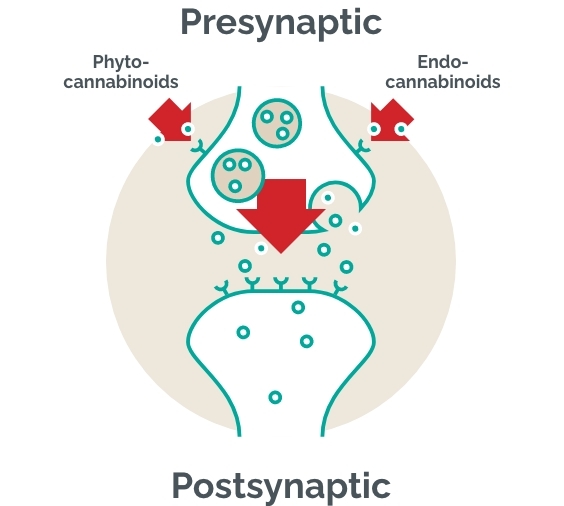
Engaging in mental health practices has become increasingly important in modern society.
No matter which way you turn, circumstances are designed to test your mental fortitude. While it's a natural part of life to experience these ups and downs, mood disorders like those listed below can begin to take hold when the emotional strain persists day after day:
- Stress
- Anxiety
- Depression
- Obsessive-compulsive disorder
- Bipolar disorder
- Post-traumatic stress disorder
Mood disorders: Causes
Several risk factors influence our psychological well-being. The most common examples include:

Genes
A family history of mood disorders

Medical history
Underlying health conditions or a previous mood disorder diagnosis

Life events
Loss of a loved one and other significant life events
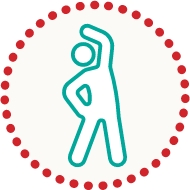
Physical state
Poor physical well-being

Medication
Medications that trigger instances of anxiety or depression

Brain function
Irregularities in brain structure or neurochemical imbalance
Mood disorders: Symptoms
The symptoms of various mood disorders differ significantly from one person to the next. However, one factor remains the same across all conditions—left to manifest, negative or anxious feelings will only get worse.
Encouragingly, recognising mood-related symptoms is half the battle. Do that, and you're already on your way to the peace of mind you deserve. Common mood-related symptoms include:
- Muscle tension
- Constant fatigue
- Difficulty concentrating
- Loss of interest in hobbies and social activities
- A rise in risk-taking or obsessive behaviours
- Reduced sexual desire
- Sudden changes in appetite
- Persistent feelings of worry
- Increased agitation or irritability
- Insomnia or disrupted sleep
- Always feeling on edge
- Unexplained mood swings

Mood disorders: Small changes you can make
- Keep a journal
Defining how you feel is easier said than done. Still, documenting your worries or concerns can help you identify patterns and pinpoint the source. Try to record how you felt, acted, and what you did to make yourself feel better.
- Complete unfinished tasks
Unfinished tasks constantly play on our minds—it’s a persistent reminder of what we haven't achieved, as opposed to what we have. The satisfaction from completing a task, no matter how small, does wonders for mental health.
- Set clear deadlines
When you complete unfinished tasks or activities, it becomes much easier to settle down and feel in control of the situation. Start by setting small, simple deadlines you want to achieve every day.
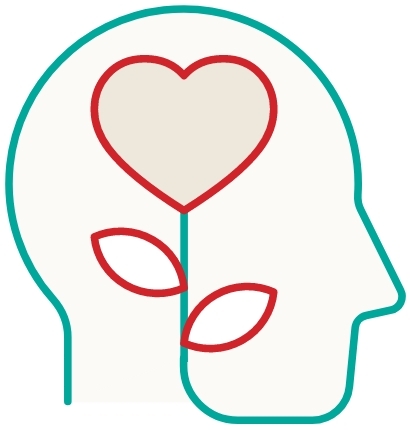
- Clear your mind
Mindfulness is a meditation technique that helps individuals deal with emotional and cognitive disruption. Whether you have five minutes free or five hours, mindfulness involves breathing techniques, guided imagery, and meditative activities (yoga or sports).
- Talk to someone
It may sound cliché, but a problem shared is a problem halved, especially regarding mood disorders. It doesn't have to be a trained professional either; don't be afraid to reach out to friends, family, or other people living with mood-related problems for support.
- Disconnect from the situation
Give your mind and body space away from emotionally uncomfortable situations. Getting up and moving helps to clear your mind, so fill your lungs with fresh air and give yourself time to get some perspective.

Counselling
Ask for professional help
Mood disorders are complex, nuanced, and specific to you. And while small steps can help, there's no substitute for professional advice. Trained doctors, physicians, psychiatrists, and therapists can provide the treatment you need to get back on track.

Medication
Medication and supplements
Many mood disorders stem from chemical imbalances in the brain—something that keeping a diary or taking long walks won't help. Supplements and medications can restore the balance of these essential neurochemicals, giving you the level playing field you need to take back control.
Ingredients that may help
| Cannabinoids | Cannabidiol (CBD), Cannabinol (CBN) | Cibdol products that contain cannabinoids are: CBD Oil |
Cibdol supports your mood-related needs with a comprehensive range of natural supplements geared to promote complete peace of mind.








